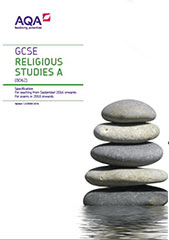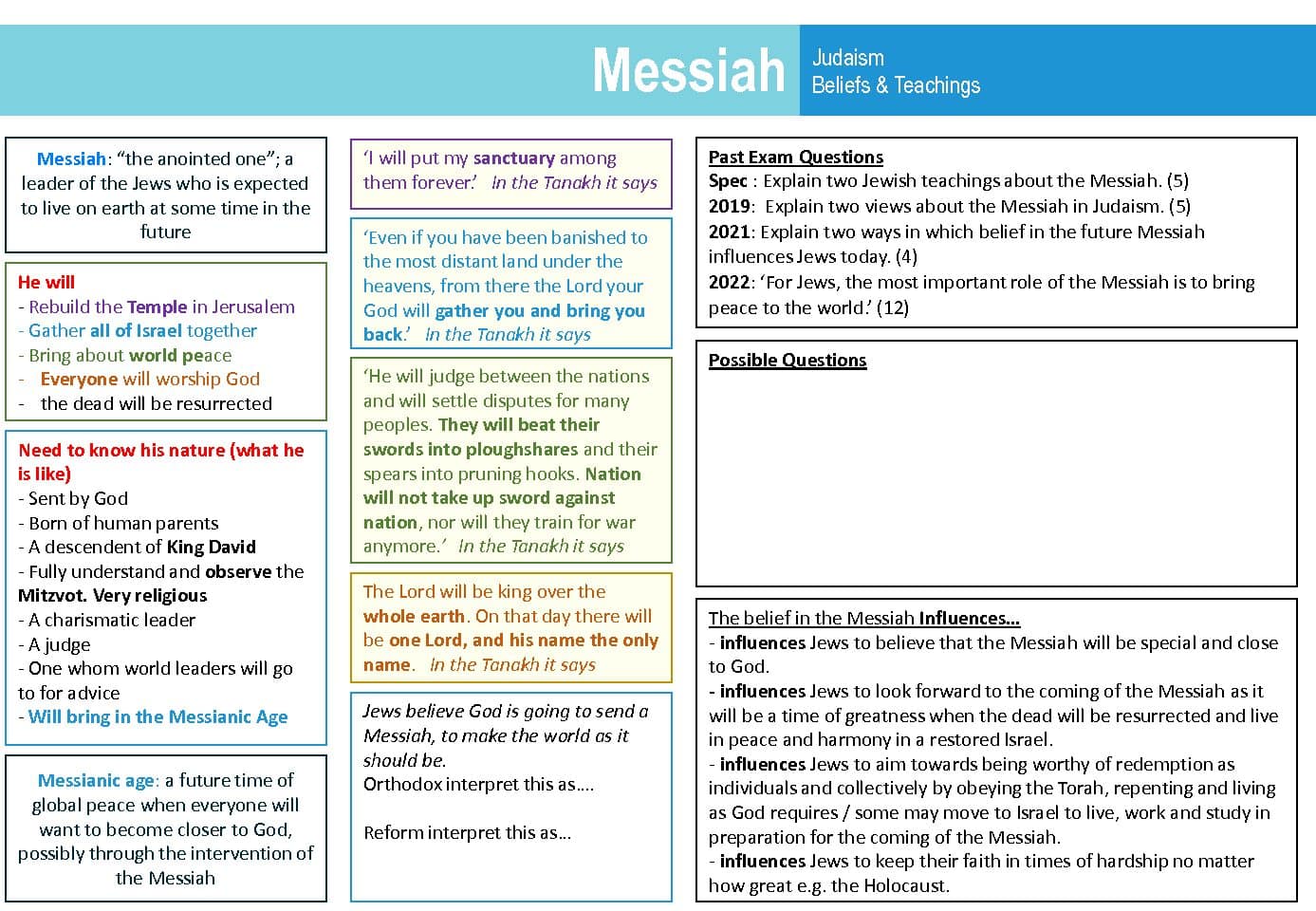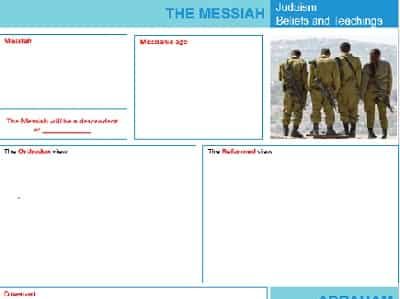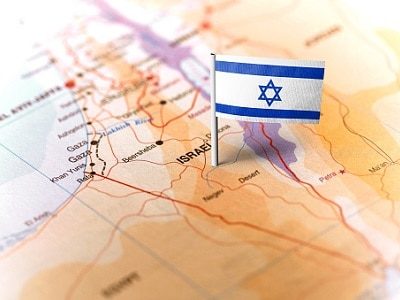JUDAISM BELIEFS & TEACHINGS
The Messiah & Abraham
-
The nature and role of the Messiah, including different views on the role and importance of the
Messiah -
The promised land and the Covenant with Abraham, Genesis 12:1-3
‘The Lord will be king over the whole earth. On that day there will be one Lord, and his name the only name.’
Zechariah 14:9
‘I will make you into a great nation, and I will bless you; I will make your name great, and you will be a blessing.’
Genesis 12:2
Messiah
Explain two ways in which belief in the future Messiah influences Jews today. (4)
2021
• Messiah means ‘anointed one’ and was first used to refer to the high priests and kings of Israel / influences Jews to believe that the Messiah will be special and close to God.
• The Messiah will rule the Jews during the future Messianic age that the Messiah will bring about / influences Jews to look forward to the coming of the Messiah as it will be a time of greatness when the dead will be resurrected and live in peace and harmony in a restored Israel.
• Orthodox Jews believe that in every generation there is a potential Messiah descended from King David who if Jews are worth redemption will be directed by God to be the redeemer / influences Jews to aim towards being worthy of redemption as individuals and collectively by obeying the Torah, repenting and living as God requires / some may move to Israel to live, work and study in preparation for the coming of the Messiah.
• Many Reform Jews believe in the Messianic age but not through any one person / the Messianic age will come through people’s collective actions including observance of religious obligations so this is what they are influenced to achieve.
• Belief in a future Messiah provides hope and comfort to those who suffer / influences Jews to keep their faith in times of hardship no matter how great eg the Holocaust / on their way to the death chambers some Jews chanted ‘I believe with perfect faith in the coming of the Messiah’ (Maimonides), etc.
Explain two Jewish teachings about the Messiah. (5)
Spec 1
the Messiah is the anointed one: direct descendant of King David; Jeremiah 23:5 Isaiah 11:2 the spirit of the Lord will be on him, he will have no fear
the Messiah will come at the end of time: he will bring peace; end injustice; after the Messiah comes, the whole world will recognise God. Isaiah 2:4 – He will be king and other nations will come to him for guidance
the Messiah will restore Israel: he will gather Jews back to the promised land, rebuild the Temple, he will restore the religious court
Explain two views about the Messiah in Judaism. (5)
2019
• The Messiah means the anointed one / in Orthodox Judaism this is the idea that an exceptional leader will come at the end of time / this leader will be a descendent of King David / a King who will rule with wise counsel / maintaining justice and Jewish religious law in the world / he will be a military leader who will win battles for Israel / Jeremiah 23:5 describes the Messiah
• In Orthodox Judaism the Messiah will bring all Jews back to the land of Israel / restore Jerusalem (Isaiah 11:11–12; Jeremiah 23:8; 30:3; Hosea 3:4–5) / the Messiah will establish a government in Israel that will be the centre of world government (Isaiah 2:2–4; 11:10; 42:1) / the Messiah will rebuild the Temple and re-establish worship there (Jeremiah 33:18) / the Messiah will restore the Jewish courts and establish Jewish law as the law of the land (Jeremiah 33:15) / also Micah 4
• In progressive Judaism the Messiah is more of a symbol for a time of peace in the future (i.e the Messianic age) / a time when people will work together for justice and fairness / a time when relationships will be repaired / morality will be restored / the righteous will be rewarded / and people of different faiths will work together to the same end, etc.
Note: Reference to anointed one in this case is appropriate.
Note: There are a small number of Jews who accept Jesus as the Messiah (but not divine). If it is a Jewish view expressed – allow.
‘For Jews, the most important role of the Messiah is to bring peace to the world.’ (12)
2022
Arguments in support
• The Messiah is expected to be a future King of Israel / Orthodox Jews believe the Messiah to be a person chosen by God / and anointed by a prophet / a great leader / a great political leader / an expert in Jewish law / who will rule during the Messianic age / living in peace in a restored Israel.
• Prophet Micah prophesied a future when war would end and people would live in peace with each other / ‘And they shall beat their swords into plowshares, and their spears into pruning hooks. Nation shall not take up sword against nation; they shall never again know war.’ (Micah 4:3) / other prophets looked forward to a time of peace and justice eg Jeremiah 23:5-6.
• Orthodox Jews believe every generation has a potential Messiah / who will be directed by God to be a redeemer if the Jews are worthy of redemption / who will rule with kindness and justice, not war and injustice / he will rebuild the Temple and usher in a time of world peace and unite humanity as one.
• Through upholding the Jewish Law and Commandments, the Messiah will establish peace and justice / preventing the need for war / other nations will look to the Messiah for guidance and his message of peace will become universally adopted / ‘How beautiful on the mountains are the feet of those who bring good news, who proclaim peace, who bring good tidings, who proclaim salvation, who say to Zion “Your God reigns”’ (Isaiah 52:7), etc.
Arguments in support of other views
• Messiah means ‘anointed one’ and was first used for Saul and the kings of Israel / some of whom were warriors / ‘The Lord herewith anoints you ruler over His own people’ (1 Samuel 10:1).
• Many Reform Jews do not believe in an individual Messiah / they believe every person has the responsibility to create world peace / the Messianic age will come as a result of people’s collective action and not as a result of a special individual / Pittsburgh platform.
• The role of the Messiah will be to uphold Torah law and be the ultimate teacher of it / rebuild the Temple and gather all Jews back to Israel (it is not part of Jewish understanding that the Messiah is a Saviour).
• The idea of a peaceful Messiah developed during times when Jews have been oppressed and persecuted / they hoped for peace and looked forward to it, even though the expectation may not be firmly rooted in the faith.
• The Messiah is sometimes portrayed as a great military leader alongside being fully observant of Jewish Law etc.
Covenant with Abraham
Give two promises God made to Abraham. (2)
2019
• Promise of the land / make you a great nation / bless you / make your name great / bless those who bless you and curse those who curse you / make your descendants numerous as the dust of the earth / leader or father of nations / promise of a son, etc
Note: Credit promises made to Abraham in other contexts, for example in the Covenant in Genesis 17, eg: kings will come from his children / the everlasting covenant / to be their God / Sarah will become mother to Isaac / the covenant with Isaac / blessings to Ishmael, etc.
Give two reasons why the promised land is important to Jews. (2)
Spec 2
God gave Abraham the promised land as part of the Covenant/God repeatedly promised to give the land to the descendants of Abraham throughout Jewish history/it is considered a mitzvah to live in Israel/ prayers are said on a daily basis for a return of the Jewish people to the land, etc.
Explain two ways in which the Covenant with Abraham influences Jews today. (4)
2018
Jews circumcise their male children (Brit Milah) in remembrance of the Covenant with Abraham / this is a direct link back to the instruction that God gave to his people in Genesis 17:10 which states, ‘Every male among you shall be circumcised’
Jews see themselves as a great nation / and an example to other nations of how God wants his people to live / and are the descendants of Abraham
Jews see Israel as their homeland / this was first promised to Abraham would be prepared to sacrifice their lives for God / ‘The whole land of Canaan, where you now reside as a foreigner, I will give as an everlasting possession to you and your descendants after you; and I will be their God.’ (Genesis 17:8)
Jews must be monotheists / worship one God alone
Jews must continue to obey God as Abraham was instructed to / they must follow God’s teachings and live an ethical life
Jews must trust in God as Abraham did / and accept that God has a plan for them, etc.
Explain two Jewish beliefs about the Covenant with Abraham. (5)
2022
• It was an agreement made between God and Abraham (Avram) / as the first Jew and thus binding on all Jews.
• Abraham was told by God to take his family from their home in Ur to Canaan / this is a model of faith and trust in God which Jews try to follow.
• When they arrived, God promised that he would give the land to Abraham and his family / became known as the Promised Land (Canaan or Israel).
• Abraham was instructed to keep his belief in monotheism / ‘walk faithfully and be blameless’ (Genesis 17:1) / not to make idols / in order that God would keep his promise to Abraham.
• God promised that he would make Abraham a great nation / would bless him / make his name great / bless those who bless you / curse those who curse you / as numerous as the dust (Genesis 13:16) and the stars (Genesis 15:5).
• Has led to the belief that the Jews are God’s chosen people / which gives them great
responsibility to remain faithful to him / or la’goyim – a light to the nations.
• The covenant was sealed by circumcision / Abraham became circumcised as did the males in his family / this has continued to the present day as a sign of the covenant / commanded by God (Genesis 17:14).
• Abraham’s wife Sarah became pregnant shortly after the covenant was agreed / the birth of a son Isaac was seen as a gift from God / to mark the covenant.
• Your descendants will be strangers in a foreign land / will be enslaved for 400 years / but then will go free / Genesis 15:5 your offspring will be like the stars you can count etc.
N.B. Do not credit the sacrifice of Isaac as part of the Covenant.
Sources of authority might include (including those mentioned above):
‘The Lord said to Avram (Abraham), “Go forth from your native land and from your father’s house to the land that I will show you / I will make of you a great nation, / And I will bless you; I will make your name great, And you shall be a blessing. / I will bless those who bless you, And curse him that curses you; / And all the families of the earth, Shall bless themselves by you.”’ (Genesis 12:1-3)
‘I give all the land that you see to you and your offspring forever.’ (Genesis 13:15)
‘For you are a people consecrated to the Lord your God; of all the peoples on earth the Lord your God chose you to be His treasured people.’ (Deuteronomy 7:6)
‘And I will give you so many descendants that, like the dust of the earth, your offspring can also be counted.’ (Genesis 13:16)
Genesis 17:1-27 – credit accurate attributed references to the covenant and circumcision.
Genesis 15:5 – your offspring will be as numerous as the stars you can count.
Genesis 16:13 your offspring will be strangers and enslaved and oppressed for 400 years, but….they shall go free with great wealth.
The Messiah
Lesson slides: The Messiah, Messianic Age, and comparing and contrast Orthodox and Reform interpretations about the Messiah
Abraham
Lesson slides: God’s promise to Abraham, God’ requirements of Abraham, and how the covenant is understood today

The Messiah
The Jewish beliefs about the Messiah and the Messianic Age

Abraham
The story of Abraham and the impact of the covenant that he made with God








